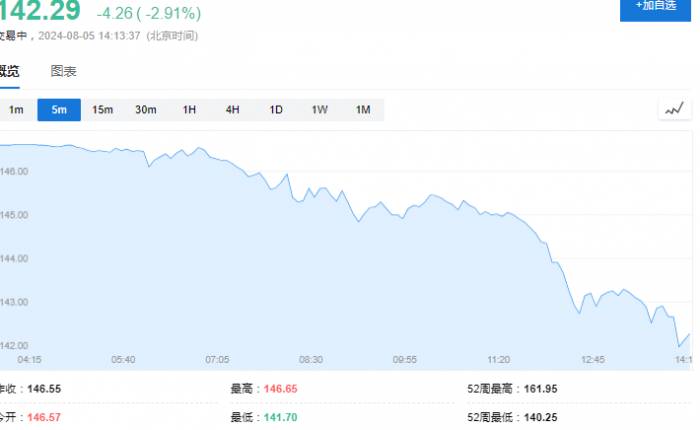Yen Shock Triggers Stock Market Frenzy, How Long Can Japanese Stocks Hold Out?
On Monday, August 5th, the Japanese stock market led a plunge in the Asia-Pacific region. By the close, the Nikkei 225 index fell by over 11%, marking the largest drop in history, with a cumulative decline of nearly 20% in three days; the Topix index closed down 12%, the largest single-day drop since 1987, with multiple circuit breakers triggered during the session.
Based on closing prices, the Nikkei 225 index has retreated by 26% from its July peak, and the Topix index has fallen by 24% from its record level, both entering the territory of a technical bear market.
Kelvin Tay, Regional Chief Investment Officer at UBS Global Wealth Management, commented that the only reason for the strong rise in Japanese stocks over the past two years has been the persistent weakness of the yen:
"Once the situation reverses, you must exit in time. I believe investors are now pulling out because of this."
In Tay's view, entering the Japanese market at this time is like "catching a falling knife with bare hands."
Due to the Bank of Japan's surprise interest rate hike last Wednesday, and the Federal Reserve's indication of potentially starting to cut rates as early as September, the expected narrowing of the US-Japan interest rate differential has caused the yen to surge, reaching its highest level since January at one point, putting pressure on Japanese trade and export companies, and thereby burdening the domestic stock market.
Advertisement
According to the stance of Bank of Japan Governor Haruhiko Kuroda, there is no ruling out the possibility of another rate hike by the bank in the future.
Has the strong yen become the trigger?
Tay stated that the strength of the yen is the "barometer" for judging the performance of Japanese stocks and was also the main driving force behind the rise in Japanese stocks. With the Bank of Japan's announcement of a rate hike, the yen's return to strength has become the trigger for the stock market crash.Wall Street News previously mentioned that due to the Bank of Japan's long-term maintenance of low interest rates, the yen is often considered one of the most attractive currencies in carry trade transactions.
For example, guided by the central bank's benchmark interest rate, before the Bank of Japan announced an interest rate hike, investors could borrow yen at a 0% interest rate and invest the funds in the United States to earn an interest of 5.25%.
With the Bank of Japan's announcement of an interest rate hike to 0.25%, which brings the highest policy interest rate since 2008, the attractiveness of carry trade transactions has significantly declined. Investors have started to exchange their dollar assets for yen, increasing the market demand for yen and thus boosting the yen's strength.
Tay predicts that as Japan's life insurance and Government Pension Investment Fund (GPIF) bring back a larger scale of yen inflows, the dollar/yen may further drop to the 135 level:
"Unfortunately, the Japanese stock market will still face greater pressure."
As of the time of writing, the dollar/yen has fallen to 142.29, with a daily drop of nearly 3%.
Margin trading accelerates the decline
Another factor that has accelerated the decline of the Japanese stock market is the liquidation of large-scale margin trading.
Under a strong bullish sentiment, retail investors had set a record for the largest margin buying position since 2006 in late July, with a scale exceeding $30 billion. As the Japanese stock market continues to fall below expectations, these investors may have to liquidate their positions.
Margin buyers generally borrow money from brokers to buy stocks, often using high leverage. If the market weakens, investors may need to liquidate, thereby exacerbating the selling.Pictet Asset Management strategist Takatoshi Itoshima commented:

"Retail investors seem to be forced to sell off."
"While it is possible that we may reach a peak in the selling wave in the short term, I am not yet certain of this."
Mitsui Sumitomo DS Asset Chief Strategist Masahiro Ichikawa stated:
"People without long-term investment experience may not have gone through such a market crash, so the impact could be quite significant."
"I believe that after such a substantial decline, the market will need more time to stabilize."